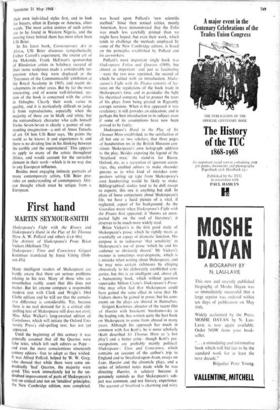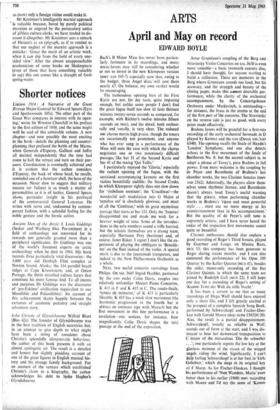Shakespeare's Fight with the Pirates and Shakespeare's Hand in the
Play of Sir Thomas More A. W. Pollard and others (cuP 60s)
First hand
MARTIN SEYMOUR-SMITH
The Artistry of Shakespeare's Prose Brian Vickers (Methuen 75s) Shakespeare : Time and Conscience Grigori Kozintsev translated by Joyce Vining (Dob- son 45s) Many intelligent readers of Shakespeare are hardly aware that there are serious problems relating to his text. Many of those who are nevertheless rashly assert that this does not matter. But let anyone compare a responsible modern text with Clark and Wright's 1864 Globe edition and he will see that the cumula- tive difference is considerable. Yet, because there is no real demand for it, a critical old- spelling text of Shakespeare still does not exist; Miss Alice Walker's long-awaited edition of Coriolanus, which will initiate the Oxford Uni- versity Press's old-spelling text, has not yet appeared.
Until the beginning of this century it was generally assumed that all the Quartos were false texts, which left such editors as Pope— and even the more conscientious nineteenth century editors—free to adapt as they wished. It was Alfred Pollard, helped by W. W. Greg, who showed that while there were some un- doubtedly 'bad' Quartos, the majority were good. This work immediately led to the un- doubted improvement of parts of Shakespeare's text on critical and not on 'intuitive' principles; the New Cambridge edition, now completed, was based upon Pollard's 'new scientific• method.' Since then textual critics, mostly American, have demonstrated that the Folio was much less carefully printed than we might have hoped; but even their work, which tends to challenge the methods employed by some of the New Cambridge editors, is based on the principles established by Pollard and his co-workers.
Pollard's most important single book was Shakespeare Folios and Q1/0110S (1909), but almost as important—and just as fascinating —were the two now reprinted, the second of which he edited with an introduction. Shake- speare's Fight with the Pirates consists of lec- tures on the regulations of the book trade in Shakespeare's time, and in particular the fight his theatrical company had to protect the texts of his plays from being pirated in flagrantly corrupt versions. When it first appeared it was revelatory; it still provides an education, and is perhaps the best introduction to its subject, even if some of its assumptions have now been proved to be faulty.
Shakespeare's Hand in the Play of Sir Thomas More established, to the satisfaction of all but one or two scholars, that three pages of handwritten Ms in the British Museum con- stitute Shakespeare's own holograph addition to the. play. Besides exposing the legend of the 'Stratford man,' the stand-in for Bacon, Oxford, etc, as a recreation of ignorant eccen- trics, this enabled editors to make shrewder guesses as to what kind of mistakes com- positors setting up type from Shakespeare's own handwriting would be likely to make.
Bibliographical studies tend to be dull except to experts; this one is anything but dull. In place of loose conjectures about Shakespeare's life, we have a lucid picture of a vital, if neglected, aspect of his background. As the Guardian wrote when Shakespeare's Fight with the Pirates first appeared, it 'throws an unex- pected light on the soul of literature'; it deserves to be much more widely read.
Brian Vickers's is the first good study of Shakespeare's prose, which he rightly treats as essentially an aspect of dramatic function. His purpose is to rediscover `that sensitivity' to Shakespeare's use of prose 'which he and his audience so obviously shared.' Mr Vickers's manner is sometimes over-dogmatic, which is a mistake when writing about Shakespeare, and he may miss certain richnesses by clinging obsessively to his elaborately established cate- gories; but this is an intelligent and, above all, a humanising book, which without question supersedes Milton Crane's Shakespeare's Prose. One may often feel that Shakespeare could have gained the same effect in verse that Mr Vickers shows he gained in prose; but his com- ments on the plays are shrewd in themselves. Grigori Kozintsev, director of the recent film of Hamlet with Innokenti Smoktunovsky in the leading role, has written quite the best book on Shakespeare to come from abroad in many years. Although his approach has much in common with Jan Kott's, he is more scholarly (Kott described Sir Thomas More as 'a lost play') and a better critic--though Kott's pre- occupations are probably mainly political. Shakespeare : Time and Conscience, which contains an account of the author's trip to England and to Stratford-upon-Avon, essays on Lear, Hazlet and the chronicle plays, and a series of informal notes made while he was directing Hamlet, is salutary because it genuinely reminds us that Shakespeare's sub- ject was common, and not literary, experience. The account of Stratford is charming and witty as (now) only a foreign visitor could make it.
Mr Kozintsev's intelligently marxist approach is valuable because, bored by purely political marxism or angered by the persecutory antics of giftless culture-clerks, we have tended to dis- count it altogether. Mr Kozintsev uses a remark of Herzen's as an epigraph, as if to remind us that our neglect of the marxist approach is a mistake: 'Great the merit of an artistic work, when it can slip from the hold of every one- sided view.' After the almost unapproachable academicism of some books on Shakespeare (even of those that have something valuable to say) this one comes like a draught of fresh spring-water.







































 Previous page
Previous page